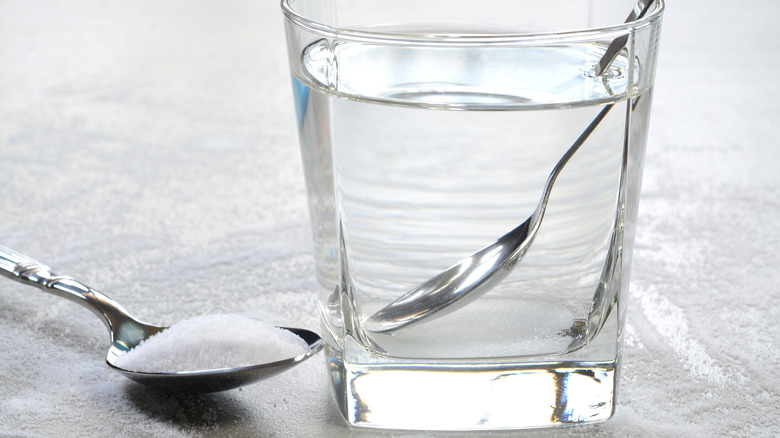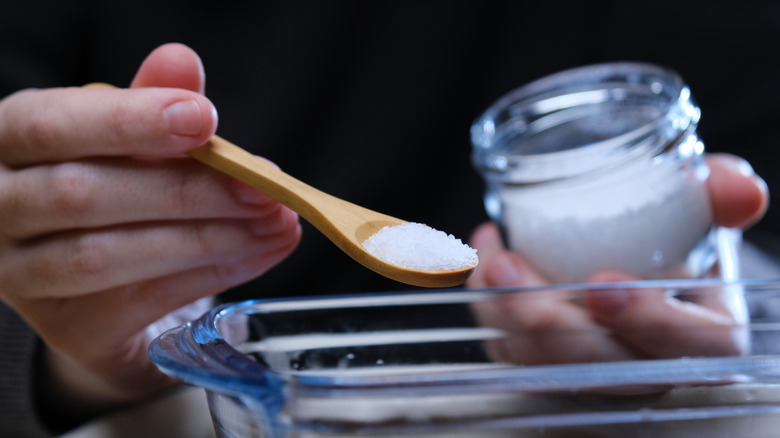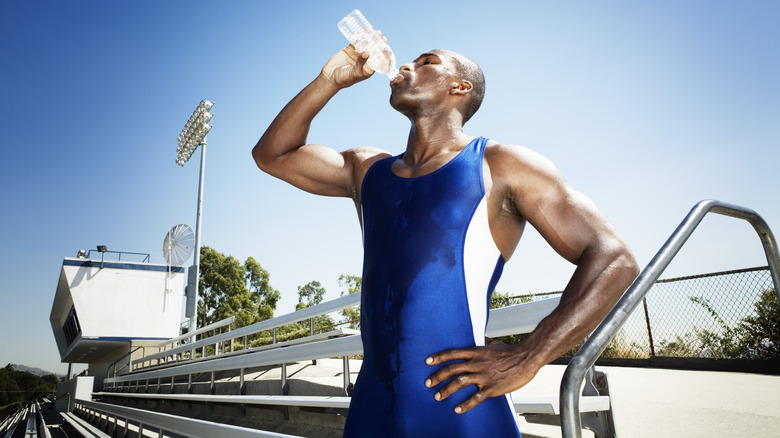Why Adding Salt To Water Can Help To Boost Hydration
Nowadays, the advice to "stay hydrated" has basically become the new "stay in school." Whether it's used as a plea from a worried mom, an instructive from a doctor, or jargon in advertising, there's no doubt it's a good suggestion.
While most of us drink all kinds of beverages every day — coffee, tea, energy drinks, soda, alcohol — sometimes we may forget to replenish with the most important one of all: water. It's one of the best options to avoid any chance for dehydration, though there are other methods like sports drinks or the hydration powerhouse known as coconut water that are also great.
And, while water alone can do the trick, there's something you can add to your drinking glass for even more hydration potential, and it just so happens to be salt. While it may seem counterintuitive — isn't salt notorious for sucking the water out of things? — it all comes down to its naturally existing compound called electrolytes.
The science behind drinking salted water
Water isn't necessarily something you may think to add salt to (unless you really happen to enjoy the taste of the ocean). But, adding a little bit to your drinking water can go a long way if you're looking for some extra hydration. Why? Because, as Health explains, salt=sodium and sodium=electrolytes.
Maybe you've seen labels for sports drinks that boast lots of electrolytes, which are touted for their hydration abilities (especially after any sweat session). That's because electrolytes are minerals very similar to sodium, potassium, and calcium that play an essential role for the body — including maintaining hydration — says Cedars-Sinai. Sodium helps your body soak up water and move it into cells, adds Health, but there needs to be a balanced amount of it moving in and out of your body in order for a proper balance to be maintained.
When you sweat, your body loses some of its supply. So the idea behind sports drinks and hydration packets that tout electrolytes is to help replenish those essential minerals you've lost. It's the same with salt: Because sodium is found in salt, mixing some of it in with your water can help replenish your electrolyte balance and, in turn, may help your body absorb more water and "stay hydrated."
Adding salt to water isn't for everyone
An important thing to keep in mind is that, while this salt-in-your-water approach definitely works to help boost hydration, it's not necessary for everyone. Your body naturally gets electrolytes through the foods you eat, so if you regularly eat a balanced diet of whole foods — spinach, kale, broccoli, almonds, yogurt, olives, fish, turkey, and chicken all contain electrolytes, while chia seeds are another hydration powerhouse — you're most likely already getting enough of the essential minerals your body needs.
In fact, when it comes to sodium in particular, it's important to monitor your intake if you eat overly salted and processed foods as too much sodium can have an impact on health.
So who should put salt in their water? This extra boost of hydration is a great alternative to sugary sports drinks or high-calorie meals for athletes and anyone that is extremely active, such as engaging in regular high-intensity workouts. It's also helpful for people who sweat more than normal (for example, if you live in an exceptionally hot or humid climate), as well as for people who lose fluids quickly for any medical reason. When in doubt, it's always best to check with your doctor.



